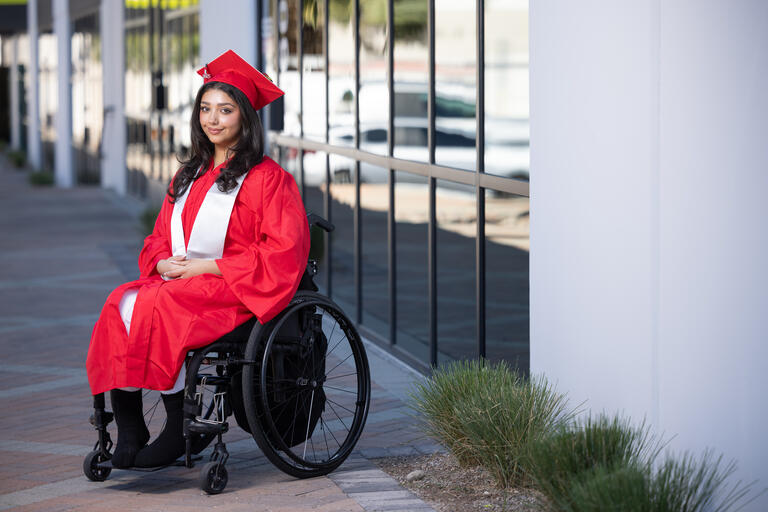This profile was prepared by Layke Stolberg, director of career services for the William S. Boyd School of Law.
Rachael Adair says it was the chance to work with students that drew her to UNLV's William S. Boyd School of Law. She is the associate director of Boyd's career development office (CDO) and judicial clerkship coordinator.
As an attorney who trained and has practiced on the East Coast, how and why did you pursue a position with the Boyd Law School?
My husband and I relocated to Las Vegas after he received a promotion with his employer. After some personal reflection, research, and informational interviews, I decided that I wanted to pursue the opportunity to work with law students -- an interest that has always paralleled my career as a practicing attorney. The more I learned about Boyd, from the intimate class sizes to the devoted and amazingly interesting professors, the more excited I became to join the team here.
What does career development office (CDO) do?
The CDO is essentially a "one-stop shop" that provides students and alumni with career information, assistance, and networking connections and opportunities. Sometimes we are the liaisons between employers and students, other times we function as advisers to students about professionalism, interview techniques, and short- or long-term career strategies. At present, my areas of expertise are advising those students who have an interest in pursuing employment opportunities in geographical areas located outside Nevada and those interested in pursuing judicial clerkship opportunities, both within and outside Nevada.
What is a judicial clerkship?
An attorney who secures a judicial clerkship is called a judicial law clerk. The law clerk is the judge's right-hand person. The responsibilities of a law clerk can vary depending on the particular judge, but typically some of the duties entail performing legal research, reviewing legal documents submitted by parties involved in litigation, and drafting legal opinions and/or memoranda for the judge's review. Responsibilities can vary depending on the type of court (i.e., trial-level versus appellate-level), the particular docket (i.e., civil versus criminal), and the judge's individual preferences or working-style.
An attorney can serve as a law clerk for a judge immediately after graduating from law school or after having gained experience as a practitioner. However, the groundwork for becoming a judicial law clerk begins during a student's first year of law school, as they begin to choose courses, contemplate internships/externship options, and gain other legal experience. In my personal opinion, applying for a clerkship is one of the best decisions that a student can make during law school. A judicial law clerk learns to view cases and legal issues from the perspective of the judiciary and, in turn, becomes a more skilled and enlightened (not to mention "connected") practicing attorney when he or she leaves the clerkship.
What advice can you provide to law students (or any student, for that matter) about positioning themselves for success?
When I was in law school, networking was a dreaded word that made me cringe each time I heard it. I ignored the concept entirely. I had convinced myself that networking was useless, I had nothing interesting to say about myself, and I just didn't want to be bothered -- I wanted to go to class, do my work, hang out with my friends, and sleep. I assumed that a job would fall in my lap. Not the case. I really wish I would have taken the opportunity to become a better networker earlier in my career.
Over time, I have learned the true value of networking and establishing relationships early, but it took me years until I reached that "a-ha" moment. I hope to encourage students to network while they are in school so they can begin to cultivate relationships that will inevitably become of increasing importance as they move throughout their career.
Where did you grow up?
I grew up in South Glens Falls, N.Y., which is a small town in upstate New York, very generally located three hours equidistant between New York City and Montreal. South Glens Falls and the surrounding area is a tight-knit community, where everyone knows everyone. When I bring my out-of-town friends to my parents' home for some fresh Adirondack air, they marvel at the number of people I wave to as I'm driving down "main street." It's a special community.
Tell us something people would be surprised to learn about you.
I was a Division I athlete in college. I was the point guard and captain of the basketball team at Fordham University -- and I'm only 5-foot-2.
What can't you work without?
Starbucks. It's an unfortunate (well, fortunate for Starbucks) addiction that I just can't kick. I was simultaneously relieved and terrified to learn that there is a Starbucks in UNLV's Student Union.
Pastimes or hobbies?
Traveling, spending time with my family and friends, brunch, watching independent films and documentaries.



